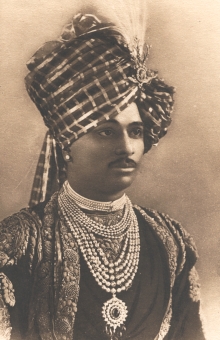Thakur (title)
This article needs additional citations for verification. (May 2019) |

Thakur is a historical feudal title of the Indian subcontinent, now used as a surname. The female variant of the title is Thakurani or Thakurain, also used to describe the wife of a Thakur.
The word Thakur means 'lord', 'god' or 'master'.[1] The title was used by rulers of several princely states, including Ambliara, Vala, Morbi, Barsoda, and Rajkot State. Sons of thakurs were given the Sanskrit title of Kumara ('prince'), popular usage being Kunwar in the North and Kumar in Bengal and South India.[2]
A Thakur's estate was called a Thakurate or Thikana, and was recognised at a salute state rank in the British Empire of India. The Thakur Sahib of Dhrol,[3] Thakur Sahib of Limbdi, Thakur Sahib of Palitana and Thakur Sahib of Rajkot[4] were recognised with hereditary 9-gun salutes, while the Thakur Sahib of Gondal received an 11-gun salute.
Etymology
It is derived from the Sanskrit word thākura meaning deity, idol, chief or man of rank.[5]
See also
- Sardar
- Mankari
- Thakkar, a Lohana surname
- Thakuri, Nepalese royal title
- Thakore caste
- Babu Saheb, title of Rajputs in Bihar. Used interchangeably with Thakur.
- Thakur (Bengali surname)
- Dharma Thakur, a Hindu folk deity worshipped in the Rarh region
References
- ^ Yule, Henry (1903). "Hobson-Jobson: A glossary of colloquial Anglo-Indian words and phrases". London: J. Murray. p. 915.
- ^ Vadivelu, A. The Aristocracy of Southern India, Volume 2.
- ^ Wright, Colin. "DHROL: Jai Singh, Thakur Sahib of Dhrole (1824-1886)". British Library. Retrieved 12 November 2016.
- ^ Strathcarron, Ian (24 July 2013). The Indian Equator: Mark Twain's India Revisited. Courier Corporation. ISBN 9780486315805.
- ^ "Thakur". Every Culture. Retrieved 12 November 2016.
External links and sources
